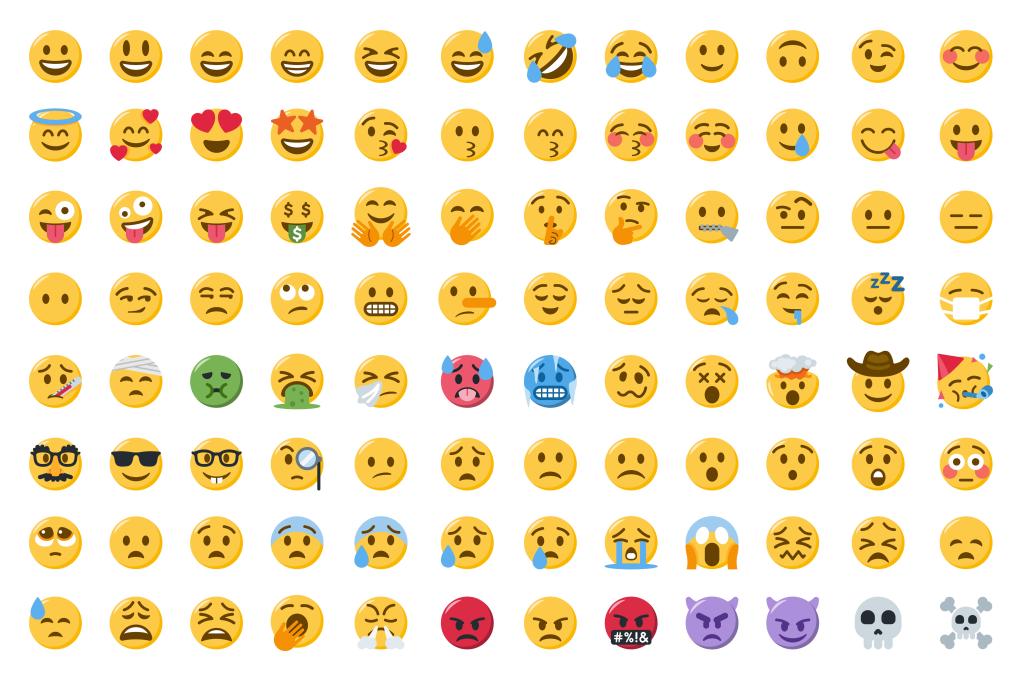am already use:
._.
Classic old school manual emojis.
Emoticons for you kids.
Okay now’s my time to shine. The words “emoji” and “emoticon” are false cognates, as in they aren’t actually related. Emoticon is a few-decade old word to describe emotion+icon, like :)
Emoji is Japanese (kanji - 絵文字) for picture-word, basically. It super outdates computers.
They just happen to sound similar; isn’t that fun?
I prefer picking a sentence or so that has meaning to me, using the first letters, and then adjusting for numbers/symbols. So if I wanted to make that a pw, it’d be 1ppa505thm2m,utfl,atafn/5. -looks completely unintelligible, but as long as you can remember the sentence and have some ideas of how you would have encoded it, easy enough to remember/recreate.
good luck remembering all of those for every account you create, though.
It’s as easy to remember a bunch of those as it is remembering 4 random words with no association, I think. And besides, just use that for the big, important, pws like your pw manager.
Why are you not using a password manager
I want cross-device
Most are cross device. Use bitwarden
Guest machines too. And I sorta prefer whichever browser/OS I’m using’s implementation because they’re usually styled similarly.
If you’re using a password manager you don’t need phrases you can remember, you can generate even more secure passwords. Or start using passkeys.
I am, and I’m not jumping through hoops of making up a password sentence for every new website. I let Bitwarden take care of that for me.
Just use these methods for the pws you either need to know (like your password manager) or don’t want stored for whatever reason, like your bank. Otherwise, yeah, just let your password manager generate a password for whatever site.
Just be sure to throw in symbols and numbers to beef it up. Dictionary words are easier to brute force.
The whole idea is to make it easier for humans to remember and more difficult to brute force. Long passwords are much harder to brute force than complex passwords with lots of special characters. And they’re a lot easier for humans to remember.
There are enough words in any language that it’s virtually impossible to guess the correct four words, even if they’re in the dictionary.
Even so, most password requirements will force you to add them anyway. Quick way to do it is to just pick a number on a keyboard and add it and the symbol to the end. e.g HorseBattery2# and so on.
You can even make a complete sentence that makes sense with symbols and numbers.
“Ronaldo doesn’t grill 76 Canadian Tacos.”
Or whatever
And requirements like that are why my password strengths are completely out of whack:
- Random websites get 24 randomly generated printable characters stored in my password manager. This is essentially unbreakable with conventional methods and can easily be adapted to fit whichever counterproductive rules the website enforces.
- My password manager and my home computers get memorable but long phrases. A particular favorite is to start in the middle of a line from a song and continue from there. Nobody’s going to guess “make you swear and curse when you′re chewing on” but it’s easy to memorize of you already know the song. Even a dictionary attack is going to have trouble with that many words.
- My work accounts get the bare minimum that complies with whichever rules the admins came up with. Numbers, special characters and mixed capitalization? No thirty letter phrase for you, then; you’ll get the minimum eight characters so I have a chance of memorizing the thing. Regular password changes? Great, now the last two chargers are going to be incrementing digits, just like for everyone else.
There’s a reason why experts these days argue against anything but minimum length restrictions.
Not 4 of them in a row. Keep in mind the attacker doesn’t know " look for exactly 4 words"
That’s just security by obscurity. It’s one other strategy of choosing passwords that a bruteforce attack is going to try if it gets popular
That’s not what security by obscurity means. And going by your definition, all passwords are security by obscurity.
If your strategy is to just use dictionary words your password will have little entropy and even less so if you use grammatically correct sentences. If the attacker knows this is your strategy of choosing passwords cracking one is way easier than cracking a password that has the same length but consists of randomly chosen characters.
Your password is only safe because the attacker doesn’t know your strategy of choosing the password which forces him to use inefficient methods of cracking it, while there would be a more efficient way if he knew the strategy you used. Which is security by obscurity.
I love it, Bitwarden has supported generating passphrase style passwords for a while and it’s basically that. It’s my go-to these days.
I like doing entire phrases with some rhymes thrown in. Makes it easier to remember them.
“BonyTonyMoansHe’sOnlyGrownLonely” has a shitload of characters, and a full sentence (even a nonsensical one like that) is more memorable to me than a random handful of disparate words.
The more ridiculous, the better. (And, naturally, don’t forget your numbers and symbols)
EDIT: Actually, no idea why I made it all one group of words. So long as spaces are in the password’s character space (and they very well should be if friggin’ emojis are), there’s nothing stopping you from doing an entire, punctuated sentence- other than that we’ve been conditioned not to think of a password that way.
“Skinny Kenny’s friend, Mini Ben, has 20 chins.” That should be a fully-acceptable password with 46 characters (48 if you add the quotes), capital letters, numbers, and special characters.
You can’t compare a 46 random character password to a password composed out of words, the entropy of each is very different. Your kind of password is vulnerable to dictionary attacks which are way more common and easy than brute forcing every possibility. A 50+ characters unique random password for each service that is stored in a password manager which is encrypted with a 20+ characters random password is the most secure and future proof (for now).
Dictionary attacks aren’t some magic bullet. There are a lot of english words and just four of them IS comparable in cracking difficult to a standard 8-char password that is as random as you can make it. There are a lot more words than there are symbols. Four words is obviously not as good as 46 totally random chars
Dictionary attacks are definitely not a magic bullet, they require a lot of processing power, just like any other brute-force attack, but not more because of their longer length, as has been implied.
True, there are a lot of english words, but the amount of common words is relatively small. Most people aren’t going to choose a password like “MachicolationRemonstranceCircumambulationSchadenfreude”, even if it were generated for them (which is unlikely).
Sure, it is comparable to a standard 8 characters passward, but even that kind of password is verging on the insecure (it is the absolute minimum, which should be avoided when possible).
There are also a lot of symbols when you count emojies and the entire Unicode standard.
If the attacker doesn’t know that you’re using a dictionary password, then dictionary attacks probably won’t be their first choice. I want to remember these passwords across devices and on guests.
Like someone else said on this thread; that’s just security by obscurity, which is bad. Dictionary attacks will be one of the first (brute force related) attacks attackers will use because word passwords are incredibly popular (though admittedly of fewer words: VeryBigDog34 etc…), and relatively easy to do. I agree that having the password across different devices is somewhat of a challenge with a password manager, but not impossible. My very long and complex password is all down to muscle memory by this point, I couldn’t tell you what it is from memory.
Also you shouldn’t use the same password on multiple things and if you don’t use a password manager you will need to memorize a lot of different passwords.
Password database
Four words is too low these days to protect against gpu bruteforcing
Got a source on that?
Edit: plus brute forcing is just one scenario. I think the xkcd comic refers to using passwords in online services, and those usually have some sort of rate limiting.
https://thesecurityfactory.be/password-cracking-speed/
8 character a-zA-Z is 45 bits of entropy (log2(56^8), about the same as the XKCD password if you take from a 2048 word list. That’s crackable in a minute on AWS.
Password hashes get frequently stolen, don’t rely on rate limiting if it’s something you really care about.
Here are the dice ware recommendations on the number of words: https://theworld.com/~reinhold/dicewarefaq.html#howlong
Sure, but the average English speaker knows way more than 2048 words. Let’s not forget about case sensitivity, made-up or “inside joke” words, names, and specific industry vocabulary.
Even if you take four words of a 30000 word list (quick Google says that’s the number of words an average person knows), that’s still less bits of entropy than a 5 word diceware password (7776 word list). People are also really bad at randomness, so your own string of random words is likely going to be much worse.
Thanks for the explanation. What’s diceware?
It’s the concept of literally using a die to choose with randomness (humans are terrible at trying to be random); a link with details is in a previous comment.
That only works if someone already has access to a system’s password database.
💯🐴🔋(umm, staple)
Correct horse battery staple!
But was it a 💯 or was it a ✅? Damn neither. Let’s try with 👍…
100 horse batteries
Jeez, you’re right. We got pens, pencils, stock charts, even those folders with the colored label tabs, but no stapler, the most basic of office equipment.
When it’s added, I expect most implementations will make it red.
I want it to be pregnant
Preganant?
If a women has starch masks on her body does that mean she has been pargent before?
¿Preganté?
Hopefully it’s compatible with skin tone modifier.
Last week or two I’ve been learning more about passkeys, and it makes threads like this seem ridiculously out of date. Given the choice between emojis and passwords and hard crypto, I’ll take the crypto.
I’m not sure what the passkey advantage over long unique password in a password database is.
Well, KeepAssXC just got passkey support so I guess it doesn’t matter much
With passkeys, your browser and the website exchange a public-private key pair then make up long random one-time “passwords” every time you login but only use them to check they each still have the right key.
I guess I’m gonna need the answer spoonfed to me. I think I understand how the tech works but I don’t understand the advantage over a complex non-reused password. Maybe keyloggers, if it’s one-time thing?
The advantage - from my very incomplete understanding - is that your passkeys cannot be phished or stolen from you. So only you from your device can log-in to the site. Which leaves me with the question, how cross-device passkeys work.
There are different ways.
One way is to use an encryption module on the device that, rather than storing the keys just encrypts the keys and holds an encryption key that you can’t extract, and can do various crypto operations.
Now you ask the module to do a secure key exchange algorithm with the new device, meditated by a party the module trusts, like apple or something.
Now both devices share a secret key, and they trust that the other is owned by the same user because the owner verified with apple who then signed the exchange messages.
Old device decrypts with the old key, and encrypts with the new key, never letting the data leave the secure module. Send the data to the new device which can do the reverse, and both devices forget the shared password.Overall, minor weaknesses like storing keys in the cloud encrypted by a key derived from a password that the cloud never sees, while objective weaknesses, are still significant net improvements to security over passwords.
Thank you for explaining. That’s a thing most sites leave out: tell people how the keys cannot be stolen while still working on a different device.
Big reason for that is the spec for how this all works being around for a while, giving people a lot of time to write about the core of how it works, but the viable popular implementations are far newer, so articles still haven’t been updated, and doing the key transfers is still one of the newest parts that the big vendors don’t want to talk about yet, because they still have to get their patents fully approved and everything.
What I described above is one way to move data between two devices in a secure way with a trusted intermediary to verify identity, but I have no idea if it’s how any major vendor actually does it, because they haven’t made that data public. It’s just what’s obvious to a sufficiently informed subject matter expert.
That would be a really nice advantage but yeah, I wonder how cross-device passkeys or recovery passkeys would work
There are lots of advantages:
- No need to worry about password encoding, like this emoji debacle for example. Actually there’s no need to worry about passwords in general anymore, no more worries about lenghts, encoding, character space, remembering them etc.
- It eliminates that scam where attackers set up a site on a domain that looks like the correct one, because the domain is part of the protocol.
- It eliminates phishing for 2FA because login only works on your device anyway and there’s nothing you can be tricked into giving away to an attacker.
- If attackers break into a site and steal the public keys they can’t use them for anything.
- Since the whole process is automated between servers and browsers and also standardized, it can be upgraded seamlessly and continously, you can upgrade the protocol, the key lengths, the encryption cyphers etc. with zero impact for the user. New upgraded versions can be distributed to both servers and browsers and they’ll just use the highest version they both have.
- 2FA is a core part of the protocol, but again in a way that eliminates phishing: it’s basically a way to unlock access temporarily to one specific key in your key vault. You can use a master password, or an USB key, or TOTP codes, or biometrics (fingerprint or face) etc., but NOT cellular texts (SMS) anymore because the vault stays on your devices, no need for another party to send you anything.
- Syncing your vault online and over multiple devices, as well as backup, are also a core part of the approach and will eliminate the worry that you drop your phone and you’re screwed forever.
The downside is that there’s been a whole bunch of tools and apps and services built around passwords for decades and converting all that mass to passkey tools will take a bit.
There are some other tradeoffs like, right now for example I can reasonably print all my passwords and TOTP codes on a few sheets of paper and achieve an “offline” backup in case of untimely death and so on, it’s going to be a bit more cumbersome with passkeys. But I expect there will be ways to optimize that as the technology evolves.
Passkeys, under the hood, use a way of proving your identity that doesn’t require you to actually send your password, and also doesn’t require you to send your username either.
Because of how it’s implemented, the system managing the passkeys also gets to authenticate that the website is who it says it is.So no private data actually gets sent anywhere, but you can prove your identity while also checking the identity of the site you’re talking to, like the SSL lock icon but automated. It’s often implemented such that the device that holds they keys can’t actually have them stolen from it, and it’s integrated with a biometric sensor.
This means it’s possible to have a high degree of confidence that the person logging in is physically the same person who created the credential, and not just someone who had their password stolen.The final perk, is that if you’re using something like a phone with a fingerprint scanner, passkeys work as two factors of authentication, despite only feeling like one.
Because the phone verifies your identity via fingerprint (something you are), it can then unlock the key that is uniquely available to the phone (something you have).Combine that with being generally easier to use, and it’s pretty clear why most security experts are pushing them. Security that users will use is better than security they won’t, and finally we have easier to use security that’s also better than the more difficult options.
What’s crypto?
Cryptography
Cryptography. As in, using encryption and encryption keys to authenticate me, rather than just a password.
Well you see there’s this thing called the Blockchain, it’s like a ledger…
Man, I sure wish I could get on the ground floor of this exciting new technology as an investor.
Might be too late for that, but BOY do I have a bridge to sell you!
You’re kidding. A real-life bridge!? You can own those!? Name your price.
Yes!
You can even change it into a toll road and return your investment in no time!
I wonder how often curse words or obscure slang are included in dictionary attacks.
What about non English words, or slang? That would be interesting information to have.
Very smart idea, because everybody knows that dictionaries exist only in the English language /s
Lots of languages have local dialects and those dialects themselves can have their own slang. In Italy the local dialects can differ quite a bit. Do you think there are dictionaries for all the local slang in the Sardinian dialect? Lots of Italian maps don’t bother to even include Sardinia.
What do you imagine is the most used dictionary for dictionary attack? English must be up there, meanwhile Finnish for example isn’t going to be quite as popular
What do you imagine is the most used dictionary for dictionary attack?
Klingon, obviously. Every hacker who ever wants to become famous must be fluent in Klingon first, as we all know.
Havent read the article yet but If you have to manually input just stick to 6 or more randomly generated words (different languages if you would like to). A keyboard won’t always have options for emojis. Your password manager’s autofill/autotype everywhere else and 2fa where you can thats it dont overcomplicate things thats a good way to screw yourself over
Emojis are known to break systems in certain circumstances due to the way they’re interpreted in certain character sets.
I guarantee people doing this will not only lock out their own accounts, but may even freeze some authentication servers.
https://www.pcmag.com/news/want-to-brick-an-iphone-send-some-emojis
auth servers breaking from emojis would be hilarious, pretty sure that’s why older auth servers only allow certain symbols in passwords
“Your password ‘🤣umådbrø⁉️’ is breaking our server. Please change it.”
“Of course. What is the server’s root password?”
OTOH, there is only one character set that matters, and any system using a different one is, by that fact alone, broken.
I said only one that matters. So I already did pick one. It’s called Unicode.
UTF-8 and UTF-16 pretty much do everything, but if you have a UTF-16 emoji in a UTF-8 system, you’ll have a bad day. :(
Those are encodings, not character sets.
IANA calls them character sets, it’s literally in the URL twice, that’s good enough for me!
If some auth server breaks because I put emojis in my password then that’s right and deserved
That only applies to iphones that came out 2016 or earlier and we’re never updated right?
For that particular bug, yes, but there have been many other variations on that theme and not limited to Apple tech. I’ve seen it nuke an email send for example because the SMTP server choked on emojis placed in a subject, to, or from line.
Thanks I appreciate the clarification
Hahaha, I wish.
You would be amazed at how ancient and poorly maintained many web servers are on the modern internet. SQL injection still consistently make the top 3 web app vulnerabilities as of 2021. If that isn’t being sanitized properly I don’t expect emojis would be handled much better.
Thanks I wasn’t aware of that
Sounds like a crappy implementation of the authentication server then, and the sysadmin deserves a paddlin’ for not stripping non-UTF characters (or making sure they work).
My problem with using emojis as part of the password would rather be that while I might be able to enter them on my personal Android phone using the exact keyboard app I have installed right now, I might find myself struggling on a desktop computer or any other phone that doesn’t have this exact keyboard installed. After all, the graphical representation of the same emoji might look different there, and there is a chance I couldn’t even recognize it.
So if anything, I’d say use a non-UTF keyboard like Thai or Chinese, but then a standard character in that specific type. Keyboards layout can be installed across devices and are fully standardized, even if the same character looks slightly different.
Stripping characters from passwords, great idea! Right up there with truncating passwords that are too long.
deleted by creator
Doing that is actually a great way to tell attackers that you’re vulnerable to that type of attack.
Bypassing those front end restrictions is super easy, and the attackers don’t need an account or a password to attack you.
It’s like putting a sign that says “lock fragile; don’t tug” on the door to your business.
It’s like putting a sign that says “lock fragile; don’t tug” on the door to your business.
That one made me chuckle, it really do be like that 😂
Learn how to sanitise your database inputs first, damnit!
That’s not how any of this works.
First of all, stripping passwords is never okay. You can reject the password and let the user choose a new one, but never just modify it on your own.
Then, if your system is at risk of code injection by certain characters in user input, please just shut it down and never turn it on again.
also some OSKs put whitespaces after inserting an emoji, some doesn’t. there’s no unified emoji input method yet.
There’s no such thing as a non-UTF8 character. You mean non-UTF8 bytes? If a system sees those, it should reject the entire input, not try to patch it up.
The website should feed your password straight into a well known hashing algorithm or key derivation function that has undergone a decade or more of careful scrutiny, without any other processing. The output will usually be a fixed length base64 or hex string.
There’s a short list of about three options that are currently considered acceptable, and a few more are probably fine but are a little too easy to crack these days (e.g. anything that shares the same math as bitcoin… what if someone throws a mining datacentre at your password?)
If the site breaks, maybe you don’t to be a customer of that service.
make one account with emoji password to test their system, if it break, good, go create hour account somewhere else
It’s not the processing on the server that’s the problem. To reach the server the password needs to go through several layers of character encoding, if any of them fails the server will receive something different from what you meant. And when you try to login from another device and the layers will be different you’ll effectively be sending a different password.
It’s not the 90s anymore.
That is very much not a 90s problem. Especially if the company has a website and an app or is a small company not thinking about these things.
In theory this shouldn’t be an issue but it definitely could be an issue on certain services.
The same character encoding that would break emoji would break a significant portion of the words names, so if your system can’t handle it, then you deserve all the trouble that you run into.
Unicode isn’t that hard.
You’re not wrong, but some systems, especially smaller ones are intended for English-only situations (or originally were) so non-English language situations might not be as well tested and/or may cause things to break.
Remember there are some sites that still refuse service if you put a
"in your password. I’m not saying it’s right, but it’s a definite possibility.
Can you still log in to wellsfargo accounts using the T9 translation of your password?
and there are many trash implementations that dont recognise something like :emoticon: as shortcut and turn it into emoji, no no you have to use emoji keyboard to type them
deleted by creator
this feeeels like the stupidest idea ive ever heard… its not like theres really an emojii standard applied as universally as text, across devices or applications… the transforms that happen… this seems fraught with terribleness
am i missing something?
If this isn’t satire, that’s literally what Unicode and UTF-8 are
Yes there is,
. I would say most modern devices/systems utilize it too. The reason they may look different from device to device is because the presentation style can be modified by vendors, somewhat similar to using different fonts to make letters look styled.
Emojis are standardized exactly the same way as text is, both are defined by the unicode standard. They might not be rendered uniformly, the same way that text rendering depends on the font.
Although I agree it is risky, emoji are unicode characters, just like any other unicode character. If, and that’s a big if, the programmers do their job right, it shouldn’t matter if you use an emoji or a random kanji. It’s all just another character. That said, I don’t trust programmers enough to run the risk. Your password might work fine on the website but then fail on the mobile app.
Someone else said “good luck on the desktop”, but Windows actually has an emoji picker built right in. Win+. will bring it up. Another fun fact, usernames and computer names both support the full unicode set on Windows, including emoji. Some fun can be had with that knowledge. I haven’t tried it on Linux or MacOS yet.
I thought Emojis were a set standard but how they’re rendered can change. So whatever it is that identifies the heart emoji is universal but iPhone, Samsung, Google, etc might render that heart differently.
How they’re rendered is a set standard now too. For example there was a bit of an issue where the gun emoji could be a water pistol pointing left or a revolver pointing right… and when it was combined with a person emoji… that could lead to… issues. It’s a water pistol everywhere now.
You mean Apple changed it to a water gun and everyone followed suite as to not have an issue?
Thanks, America, and your mass shootings.
I didn’t know that, thanks
I’d rather staple my forehead to a telephone pole before I ever think about using an emoji in a password. Those things are abominations!
👆
Out of curiosity, what makes you say so?
Edit: Oh. Did a “Wooosh” happen to me right now? Are you being ironic and referring to the XKCD thing about how to make a secure password using words in phrases?
Because they’re a major pain to type, except for the most common ones?
I think OP is conflating the use of emojis in passwords with the use of emojis by the general public.
Yes, it’s annoying to read stuff like “Hi 😃😃😃😃 I am Bob ♥️♥️♥️😎😎😎😎,” but that doesn’t mean that using them in passwords is a bad idea.
Or that “hi 😊 I’m Bob” doesn’t express a (subtly) different meaning to “hi, I’m Bob”
Well they have to be the same on different devices, like you log in to Lemmy on your PC and then on your phone. Also sometimes it seems the icons change, or there are new ones and maybe old ones are removed …
Emojis are standardized. They may look different in different devices, but the code of a “raised hands” emoji will always be the same, just like the code for A is always the same.
Removing old ones could be a problem, though.
Just like a gun is standardized to a water gun for some and a real gun for others?
Edit: I get your point, ita just if you memorize your password with emoji icons different icons would screw up your tries to log in
If you search for “gun” in your device when selecting an emoji, just pick whatever comes up. Done.
What if I am using a device that doesn’t support emojis? wouldn’t I need to learn the code for each emoji I have used in a password?
That’s a good question, and yeah, I guess you’d either avoid using emojis or accept the fact that they’re not universally supported.
Having said that, some people use non-ascii characters in their passwords, such as Œ which is a valid letter in some alphabets, and they’d run onto the same issue.
Yes
But how many modern devices don’t somehow support emojis though?
And how many of those you need to enter a password in?
deleted by creator
I can agree with you. I’m curious what these reasons are, though?
Long time ago a friend of mine used a set of key press to generate a smiley face to put in his bios which ended up in a situation where he was not able to type in the same smiley face into the password prompt. I had to teach him to reset his bios battery to get back into the bios.
You’re a good friend
As a software developer who has worked with a lot of symbols and emoji… PLEASE DON’T DO THIS.
Software doesn’t all handle these symbols the same way, and without tech knowledge (or even with) , it’s very possible to not be able to log in easily. I’m kinda drunk rn, but I’ll try to explain as simply as I can…
For example… skintone emojis are actually two characters, a face and a skin tone modifier. I think those ones are always two characters but some of these “multi-char” characters can be normalized into a single character. But not everyone handles this the same way. For example, Safari might normalize the emoji, but Firefox might treat it as two separate characters… And this would probably make your password not match. But basically… text has lots of edge cases; I’d advise to use normal passwords please (also maybe a password manager)
Thanks for the feedback! I’ll be sure to use non-printing characters instead of emojis for my passwords! (They can’t guess it if it’s invisible right?)
In all seriousness, why are people so adverse to using password managers? People are plenty willing to use the browsers built-in “remind my password” instead of a proper password solution such as bitwarden… And they come up with such “hacks” just to avoid using a proper length password.
Was gonna say… you’re relying on the consistency of external emoji handlers that you don’t control. Ascii emojis are one thing.
Is my explaintion ok? The hard kombucha was… harder than I anticipated
It was pretty normal lol. Basically everything between the visual of an emoji and what “text” is entered is not in your control. So it’s great for security but not in practice as a password. What brand was the kombucha I want some.
I didn’t realize NYC has a physical Juneshine location. So I got a flight… and a Juneshine cocktail…
Terrible idea, good luck logging in on desktop.
For Windows 10/11, its win+; to open the emote window.
It’s Windows logo key + . (period).
Both work for me and I haven’t messed with the keybindings for it.
Who needs Reddit when people like you are here on Lemmy.
That doesn’t work on the desktop last I checked.
But it’s actually possible to set a password with emojis anyways (or at least for domain accounts). I successfully logged in on a VM using the Hyper-V window and pasting the emoji from the host. You can also name an account a single emoji and windows actually handles it decently. It’s very likely to break a lot of programs though.
It worked on my desktop
😁👍╰(°▽°)╯
Works even in notepad on Windows 11, lol
Oh I meant the lock screen, sorry. As far as I know it works everywhere except the lock screen.
oh, I never tried. There goes that option. Wonder if that was intention to prevent people from trying to use emoji passwords because they didn’t trust windows to handle it.
It’s probably just because the emoji panel is a program and the lock screen has very limited or any capabilities to run any programs. And trying to make it the emoji panel to function on the lock screen is pretty much a waste of time anyways.
Its worked on desktops for years and works right now. As someone else pointed out “win+.” works as well. Or maybe its supposed to be the only way it works and mine is bugged? Idk. I found it via trying to lock my desktop and mistyping.
Cmd+Ctrl+Spacebar on Mac
Huh! TIL ☺
Wait, you can’t type emoji on your desktop? I feel sorry for you. 🥺
I have no idea how you could either. I don’t know how to create them with s keyboard
Winkey + .
Works on Windows and some Linux distros by default
Firefox has an addon that opens up an emoji panel.
Under Windows press Win+.
You know there’s someone somewhere who would answer you with, “what’s a desktop?”
deleted by creator
Listen here, you little shit
Here is an alternative Piped link(s):
Piped is a privacy-respecting open-source alternative frontend to YouTube.
I’m open-source; check me out at GitHub.
Dammit I’d forgotten that awful commercial. Angry upvote.
I’m still in denial 😅
I began feeling old when re**itors started calling their site an ‘app’
You can say Reddit it isn’t blasphemous
I disagree with them.
- Emojis do not look the same on all platforms. Let’s take
white large square⬜ for example. Emojipedia shows what that emoji looks like on 26 different vendors. Some are pure white, some are shades are grey, and then there’s Microsoft who in its usual infinite wisdom decided it should be purple.large yellow square🟨 is a tossup between actually yellow and orange. This issue is also exacerbated with different displays displaying colours differently. Factors such as color accuracy, viewing angle, brightness affect how you perceive colour.

This also extends to face emojis.
grinning face with big eyes(Emojipedia link) isn’t that easy to tell apart fromgrinning eyes(Emojipedia link)- Emoji support depends on your device. I’m on Windows 11 22H2 which recently added support for
shaking face🫨. Problem is, Windows’ emoji pickerWin+.(period) doesn’t have it. Trying to login on a friends phone that’s still on iOS 15 or Android 12, beforeshaking facecame out? Enjoy manually copy/pasting the emoji from Emojipedia.
correct horse battery staple on the other hand looks the same on all devices.
- Emojis do not look the same on all platforms. Let’s take
No. There’s only one piece of advice that should be given to users in 2023 about how to make their passwords stronger:
Use a password manager
Just use 32 character random alphanumeric passwords that are unique for each site (you can do more like 12-16 characters if you’ll ever need to enter manually).
This is it. Stop trying to create clever passwords that you can remember. You aren’t as uniquely creative as you think and there’s been bodies of research into how the various things people do to create passwords that look secure can reduce the generation space so much that they become considerably easier to crack with an intelligent algorithm.
How many websites/services don’t support such lengthy passwords these days?
Few, but those that don’t you can just shorten the length generated.
I got it to a stable 54% by using an
algorithm
typing f or d for consonants and vowels respectively in sentences I thought up, switching languages regularly,
and a stable 56% by just typing randomly and adjusting my patterns based on the colored output, which might have skewed my results. Certainly a very cool tool, I also liked the explanation linked on the page!
Security expert reveals surprising way to induce headaches
Security experts don’t actually have to work on corporate IT systems.
So you’ve set your password to contain a 😇 have you?
Ok so how are you going to type it on this desktop computer keyboard here…
Yeah I thought not.I’ll just go reset your password shall I?
win+.(works on kde too afaik…?)I’ll let you be in charge of teaching them that. I literally had to talk someone through how to type an exclamation mark today, I don’t think they’re going to handle the extended Unicode character set.


































